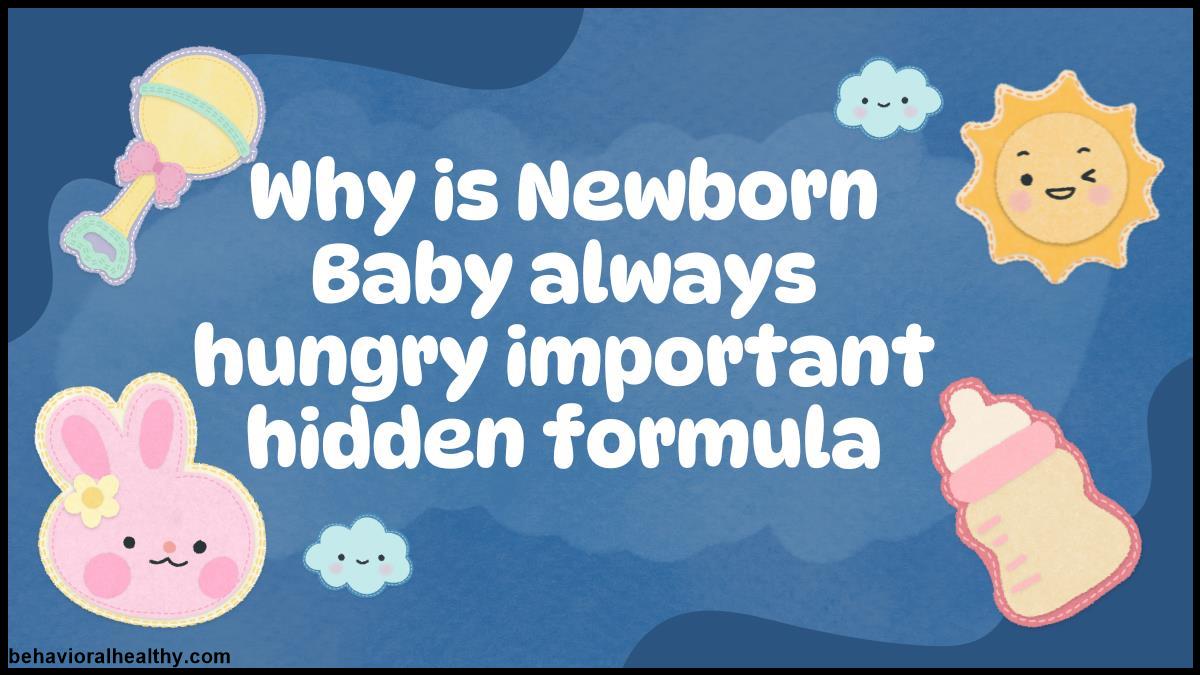Are you a new parent with a little one who is constantly hungry? It is frustrating when you find yourself feeding your baby for a few minutes.
Table of Contents
Constantly Hungry Newborn? Common Causes and Solutions
Are you a new parent with a little one who is constantly hungry? It is frustrating when you find yourself feeding your baby for a few minutes, only for them to cry moments later. It signals that your baby needs more milk. A common question many moms ask is, "Why is my newborn always hungry?” It goes on your mind.
If you are a breastfeeding mom, your baby’s constant hungry signals can be confusing. It is normal, but you should take the necessary steps. You should understand the causes and solutions. It helps you to manage these frequent feeding sessions. Let’s explore the common reasons why your baby is crying:
The Common Reasons Why a Baby is Crying
Below, you can see the common causes and solutions for their hunger.
1. Growth Spurts Are Natural
In the early stage, babies can grow quickly. For this quick growth, it requires extra energy, and one immediate way babies can grow is through feeding. Newborns experience growth spurts around
- 1 week
- 3 weeks
- 6 weeks
- 3 months
During these spurts, babies seem more hungry than usual. Because their bodies prepare for the next phase of growth. Still, you are thinking about “Why is my newborn always hungry?”, it may be that the baby’s small stomach digests milk easily in a short time.
Solution:
If your baby wants more, you can give as much as they feel full. During a growth spurt, you should feed your baby whenever they signal hunger. Frequent nursing meets their hunger needs and helps stimulate milk production if you are a breastfeeding mom.
2. Cluster Feeding
Cluster feeding occurs when your baby needs more within a short time. This phase can feel overwhelming as it might seem like your baby is feeding nonstop. In a baby’s development phase, cluster feeding is temporary and essential.
Solution:
Cluster feeding can be exhausting, and it is a sign your baby is going through a normal developmental phase. You can prepare for this by setting up a comfortable space. At that time, you should not be under stress. This behavior will taper off in a few weeks.
3. Inefficient Feeding
If you are a breastfeeding mom and your baby is still hungry, it will indicate an inefficient latch or it may be the fault of baby sucking technique. Inefficient feeding can make it harder for your baby to get enough milk. It can leave your baby hungry.
Solution:
If you suspect latch issues, you should consult with a lactation consultant. They can provide personalized guidance to improve your breastfeeding technique. A proper latch ensures your baby is getting enough milk, and it can help reduce their hunger.
4. Formula-Fed Babies
Some parents may find that their formula-fed babies are always hungry. It is because they require more milk, or you need to feed them frequently. It is different from breast milk, and you can adjust it based on the baby's needs. The formula doesn’t change, and it may leave your babies even more hungry.
Solution:
If your baby is formula-fed and also constantly hungry, you can check with your pediatrician. They can ensure you are offering an appropriate amount of formula. Some babies may need more milk, but ensure you are following your baby’s cues. You should not overfeed your babies.
5. Comfort Feeding
You should remember the feeding session because of constantly maintaining your baby's hunger. During the early stage your little one suck for comfort. This soothing action can be mistaken for hunger, but your baby might look for comfort or security.
Solution:
If you suspect comfort feeding, try offering your baby a pacifier or soothing them in other ways, like rocking or swaddling. Comfort feeding isn’t harmful as long as you’re also meeting their real nutritional needs, but being able to differentiate between hunger and comfort can help prevent unnecessary feedings.
6. Digestive Issues
If your baby is still hungry and your baby feels uncomfortable after feeding, it might be due the digestive problems, such as acid reflux or gas. These conditions can make it difficult for babies to feel satisfied. It can lead to
- Feeding
- Discomfort
- Hunger
Solution:
You can consult your pediatrician if you suspect reflux or digestive discomfort. They can recommend feeding strategies or medications. It helps manage these conditions. Sometimes, you should position your babies properly to reduce these problems. You can also feed a smaller quantity of meals.
Final Words
A newborn little one is constantly hungry, it can be difficult for moms to handle. If you are asking, “Why is my newborn always hungry?” Maybe they are experiencing a growth spurt.
You can consult with a pediatrician if you have any problems with your feeding. Your baby’s constant hunger will settle after proper and timely feeding. It gives you peace and stability. You should listen to your baby’s cues, and you will find your rhythm together.

